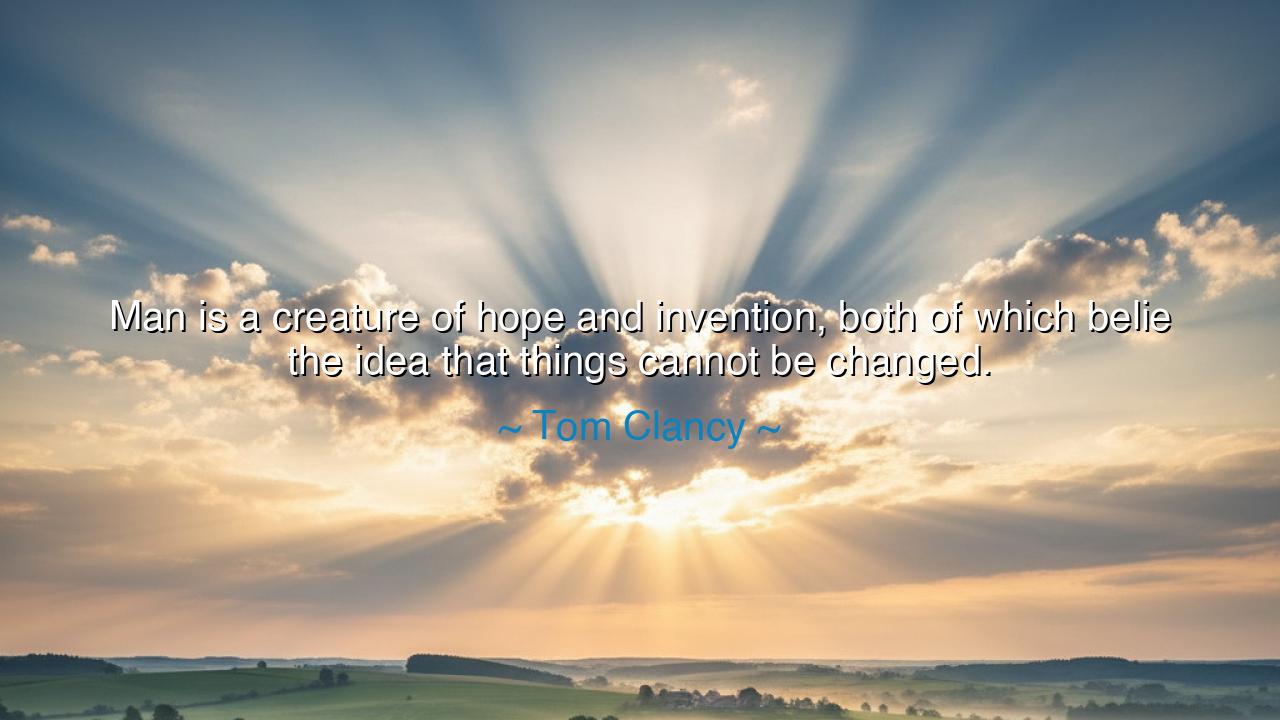
Man is a creature of hope and invention, both of which belie the
Man is a creature of hope and invention, both of which belie the idea that things cannot be changed.






The words of Tom Clancy, though spoken by a man of modern times, carry the enduring strength of ancient truth: “Man is a creature of hope and invention, both of which belie the idea that things cannot be changed.” In these few lines lies a powerful reflection on the very nature of humanity—our refusal to surrender, our unyielding drive to build anew, and our eternal belief that tomorrow can be different from today. Hope and invention—these are not mere ornaments of the human spirit; they are its heartbeat and its breath.
To say that man is a creature of hope is to say that within him burns a light that no darkness can fully extinguish. It is the same light that has carried our kind through war, famine, and despair. Even in the ashes of ruin, humankind looks upward and whispers, “There must be a way.” This faith in the possible, this refusal to accept the permanence of pain, is what has always distinguished man from the beasts of the field. Hope is not naïveté; it is defiance—a sacred rebellion against despair. It is the soul’s declaration that change is not only needed, but inevitable.
And yet, hope alone is not enough. For hope is the seed, but invention is the hand that plants it. To invent is to act upon belief—to take the formless and give it form, to translate vision into reality. Invention is hope made tangible. The great builders, scientists, and thinkers of every age have been driven by this marriage of spirit and will. When Tom Clancy wrote these words, he was not merely speaking as a storyteller of technology and warfare; he was honoring the creative force within mankind—the power to dream of what does not yet exist and then summon it into being.
Consider the tale of Thomas Edison, who in his youth was told that he was too slow of mind to learn. Yet it was he who later gave light to the world through the invention of the electric bulb. How many failures did he endure? How many nights did he work without rest? Yet with every failure, he held to hope, and through that hope came invention. He refused to accept that things could not be changed, and in doing so, he changed everything. His story, like that of countless others, proves Clancy’s truth: that human progress is born not of certainty, but of faith in the possible.
In every age, there have been voices declaring that the world has reached its limits—that suffering is unchangeable, that poverty is eternal, that injustice is inevitable. Yet time and again, humanity defies such prophecies. The abolition of slavery, the triumph of medicine over disease, the flight of man into the heavens—all these were once dismissed as impossible. And yet, through the dual power of hope and invention, the impossible became the inevitable. Every great transformation begins with a soul who dares to say, “It does not have to be this way.”
But the wisdom of Clancy’s words goes deeper still. They remind us that hope and invention are moral acts, not just mental ones. To invent is not only to create machines or tools, but to create solutions—to build bridges where there were once walls. When we forgive, we invent peace. When we teach, we invent knowledge in another mind. When we persevere, we invent a future where once there was none. Every act of goodness is a quiet revolution, for it declares that change is not only possible—it is our duty to bring it forth.
Lesson and Practice:
Do not believe those who say that things cannot be changed. When despair whispers that the world is broken beyond repair, answer it with action. Nurture your hope not as idle dreaming but as sacred energy. Create, build, imagine, forgive, and labor toward the better world you wish to see. Let invention be your response to suffering, and hope your defiance against the void. Remember always that you are, as Clancy wrote, a creature made to change things. As long as hope burns in your chest and your hands are willing to work, no fate is final, and no darkness is absolute. For mankind’s destiny has always been written not in resignation, but in creation.






AAdministratorAdministrator
Welcome, honored guests. Please leave a comment, we will respond soon